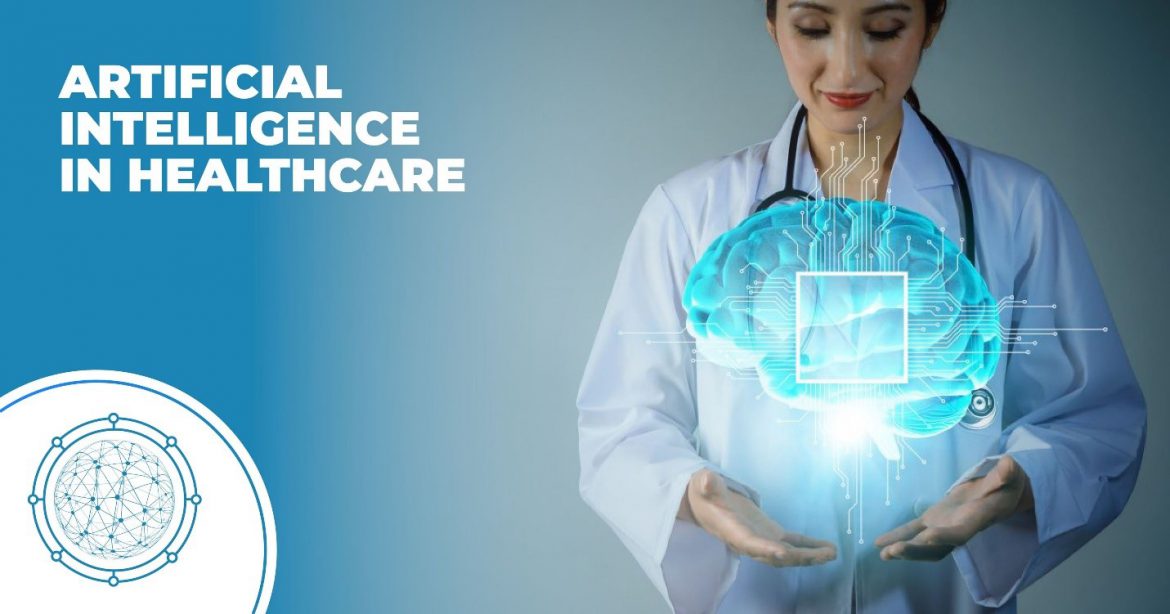Table of Contents
Artificial Intelligence in Healthcare 2022
Advancement in technology has made us rely on it for every aspect of our lives. It plays an integral part to ensure the smooth flow of an industry. From all the industries Artificial Intelligence has been linked to, Healthcare has to be one of the most important ones. This merger is one of the main reasons why the medical field is developing and saving countless amount of lives worldwide. The dependence of Artificial intelligence in Healthcare cannot be overstated, as a result, this technology integration has allowed healthcare practitioners to continue to find ways that will help improve their practice.
With more hospitals and practices involving the use of electronic devices, all the data can be stored and recovered in space of seconds whenever required. Here we will discuss how important the introduction of Artificial intelligence in Healthcare has been and how it is proving worth the investment.
What are examples of Artificial Intelligence in Healthcare?
Recent studies have shown that medical errors have caused an estimated number of 251 thousand deaths annually. One of the most important and exciting aspects that Artificial intelligence in healthcare has to offer is the significant improvement in the diagnostic process.
Following are some examples of Artificial intelligence in Healthcare:
-
Buoy Health (Symptom Checker):
A chatbot listening to a patient’s health concerns and symptoms uses AI algorithms to firstly diagnose the illness and then guide the patient to follow the correct care based on the found diagnoses.
-
Freenome (Cancer Detection):
Through the use of Artificial intelligence in screening, diagnostic tests, and blood work, it aids to detect cancer at fairly early stages while also developing new ways to treat the illness.
-
Enlitic (Actionable Insights)
This deep learning medical tool streamlines radiology diagnoses. It works perfectly with deep learning to analyze unstructured data that assists doctors to have a better insight into the real-time needs of a patient.
-
Zebra Medical Vision (Radiology Assistant):
By analyzing the imaging scans it receives, Zebra Medical Vision can deduce some clinical findings that it has studied. These findings can assist radiologists in making the final diagnosis.
-
Bioxcel Therapeutics (Biopharmaceutical development):
With the integration of Artificial intelligence, Bioxcel can create new medicines that are being developed in the field of immune-oncology and neuroscience. It is also able to detect the actual potential of an existing drug and finds new applications for it to be used in.
-
Atomwise (Clinical Trials):
Artificial intelligence has enabled Atomwise to detect the most core and serious diseases in today’s world, like Ebola and multiple sclerosis. After the screening of nearly 10 to 20 million genetic compounds and can deliver the results much faster than traditional methods.
-
Benevolentai (Targeted Treatment):
The main goal of this system is to produce a better-targeted selection and a clear insight into previously undiscovered options for treatment. This assists in finding accurate treatment for the right patient canceling out the risk of misdiagnosis.
-
Olive (Automating repetitive processes):
The design has specifically been created to automate the most repetitive tasks in the healthcare industry, thus allowing practitioners to work on high-level ones. This automation helps reduce the administrator’s workload enabling them to provide a better patient service.
-
Babylon Health (Access to healthcare):
It provides interactive healthcare to its users, including a face-to-face appointments with authenticated doctors. The AI-powered chatbot analyzes the condition of the patient through the responses it gathers and then guides them to either a virtual or physical visit to a doctor.
-
Qventus (Patient flow optimization):
Qventus focuses on providing solutions to operational challenges related to emergency rooms and patient safety.
How is artificial intelligence used in Healthcare?
Health is a matter of life and death and it must not be treated to experimentation. Artificial intelligence in healthcare is an intriguing concept, as to which governments, and many tech companies along with healthcare providers are least hesitant to invest in these AI-powered tools.
Here is the list of some of the most advanced ways Artificial intelligence has been put to use in the medical department:
- AI-Assisted Robotic Surgery
- Aid Clinical Judgment
- Virtual nursing assistants
- Workflow and administrative tasks
- Image analysis
These are some of the many ways AI is making significant changes to healthcare, paving a path to constant development. This link between artificial intelligence in healthcare provides fast: service, diagnostics, and genetic reports. Saving the few seconds along with the authenticity that the results hold, Artificial intelligence in the Healthcare sector seems to pay off the bills.
Best Application of Artificial Intelligence in the Healthcare sector
Artificial intelligence is the most effective technology that is being used in the modern healthcare department. The rapid growth has provided the healthcare sector a strong foothold, which has in return allowed them to give the best services to the patients.
This merger has created many systems that are being put to various uses, however, there’s one that sparks the interests of all the personnel working in the department. Cognitive surgical robots are able to gather data from real surgical processes to alter and improvise the existing approach in a way that is more feasible and has greater chances of success. These pre-op medical records assist the physicians to obtain a better insight into the situation and avoid any mishaps during the on-going process.
Artificial intelligence in Healthcare Pros and Cons
| Pros | Cons |
| Easies access to health facilities | Lack of human-like emotions |
| Earlier Diagnosis | Overtaking human jobs leading to a higher unemployment rate |
| Useful assistance while performing surgeries | Mistakes are still a possibility |
| Supports people with disabilities | Many social implications e.g. Expensive cure to a disease. |
Are you interested in High-Tech Medicine?
For more information on Artificial Intelligence in Healthcare, follow us on our Facebook page High-Tech trends.





